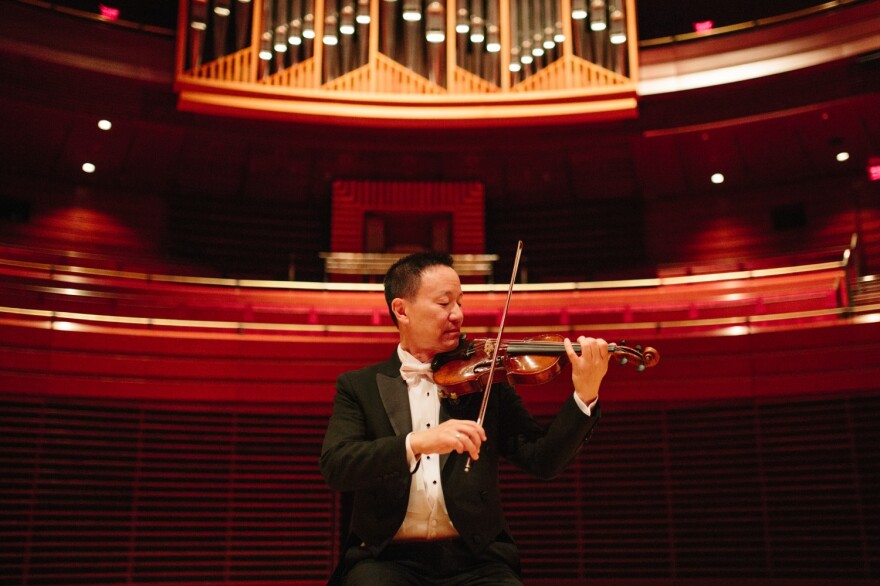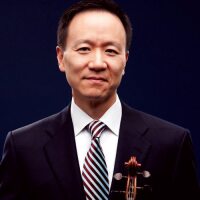Join us on Sunday, Sept. 22 at 1 p.m. on WRTI 90.1 and Monday, Sept. 23 at 7 p.m. on WRTI HD-2 as The Philadelphia Orchestra in Concert brings you Mozart’s Symphony No. 39, plus the Four Seasons by Antonio Vivaldi and The Four Seasons of Buenos Aires by Astor Piazzolla. Guest conductor Xian Zhang is on the podium, and the violin soloist is Philadelphia Orchestra concertmaster David Kim.
In the summer of 1788, Mozart composed his final three symphonies in a rush of inspiration. He would live another three years, but would never return to the symphonic form. These last three symphonies – numbers 39, 40, and 41 – have come to be viewed as a masterful summation of his approach to the form. He seems to have viewed them as a trilogy, churning them out in a mere six weeks.
Of the three, the 41st in C Major, known as the “Jupiter,” and the 40th in G Minor, have somewhat overshadowed the 39th. But it is easily their equal in grandeur, grace, wit, and inspiration. It’s not known for certain what performance plans the composer had for these last three symphonies, but one theory holds that Mozart planned to travel to London to visit Franz Joseph Haydn, whose famous London symphonies were being successfully presented there. Mozart may have hoped these three grand works of his would also get a hearing in the English capital. That journey, though, never took place.

David Kim celebrates his 25th anniversary as The Philadelphia Orchestra’s concertmaster with his solo appearance in two sets of music inspired by the four seasons. There may be no more famous evocation of this subject than the four violin concertos written by Vivaldi in the early 18th century. These overtly pictorial works place the listener firmly in each season. “Spring” opens with cheerful birdsong, but also includes a momentary downpour. We can literally hear the sun scorching the ground in the “Summer” concerto — until a fierce thunderstorm breaks the heat. In the “Autumn” concerto, peasants celebrate the harvest with dancing, while aristocrats engage in the hunt. And “Winter” opens with a frigid chill and closes with rushing winds and cracking ice… relieved only when we find ourselves at the quiet fireside indoors.

Some 250 years after Vivaldi’s concertos appeared, Astor Piazzolla, the Argentinian tango master, also found inspiration in the changing seasons. Piazzolla was a virtuoso on the bandoneon (something like an accordion). An active professional musician and composer, his music crossed over from popular music to concert music and back again. His four tangos named for the seasons were originally played by Piazzolla’s band, consisting of violin, piano, electric guitar, double bass, and bandoneon.
They were later arranged for violin and strings by Leonid Desyatnikov, and in that form they are often performed interspersed with the Vivaldi concertos, as Kim plays them. He calls this musical mashup “a wonderful shock to the system” that audiences love “because you play one of the Vivaldi seasons and everybody recognizes the beautiful melodies, and then suddenly you go — boom! — and out comes this incredibly sexy and vital tango music.”
PROGRAM:
Mozart: Symphony No. 39 in E-flat Major, K. 543
Vivaldi: The Four Seasons
Piazzolla, arr Desyatnikov: The Four Seasons of Buenos Aires
The Philadelphia Orchestra
Xian Zhang, conductor
David Kim, violin
WRTI PRODUCTION TEAM:
Melinda Whiting: Host
Alex Ariff: Senior Producer
Joseph Patti: Broadcast Engineer
Listen to The Philadelphia Orchestra in Concert broadcasts every Sunday at 1 p.m. on WRTI 90.1, streaming at WRTI.org, on the WRTI mobile app, and on your smart speaker. Listen again on Mondays at 7 p.m. on WRTI HD-2. Listen for up to two weeks after broadcast on WRTI Replay, accessible from the WRTI homepage (look for Listen to The Philadelphia Orchestra in Concert On Demand).


